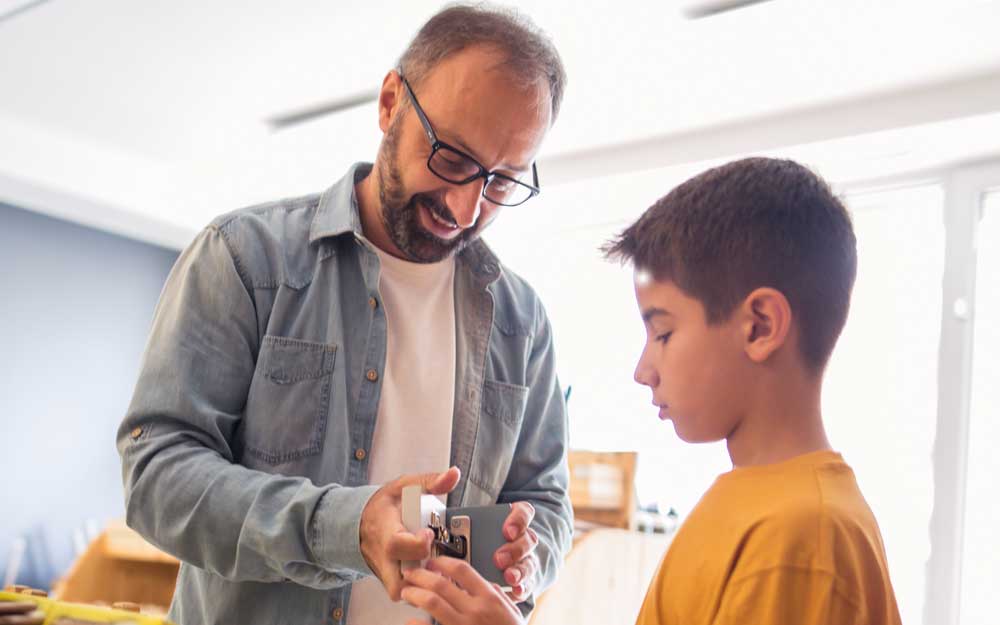
Promoting a healthy culture at Rogers
In order to provide the most effective treatment possible for our patients and their families, it’s important that employees feel supported and encouraged each day. That’s why Rogers strives to create a healthy culture where everyone, patients, and employees, can grow and feel welcome, safe, and respected.
Rogers Culture Agreements
Putting Rogers’ values of compassion, accountability, and excellence into action with each other
To create an environment of belonging and inclusion that demonstrates respect for the dignity and diversity of all people, we seek to consistently behave in the following ways:
- Be open and welcoming to all through our presence, tone, words, and body language.
- Work to minimize the impact personal biases have on your treatment of others.
- Respect various cultural values surrounding communication.
- Practice mindful presence with colleagues.
- Speak up when we see problems or conflict in the workplace with a solution-focused, strength-based perspective.
- Seek to understand and value diverse perspectives.
- Pause to set aside judgments. Be curious. Embrace discomfort.
- Assume positive intentions.
- Practice active listening.
- Determine if broader understanding needs to lead to consensus on action or not.
- Work together as a team to accomplish goals.
- Take responsibility for contributing to team and share credit for positive results.
- Identify and engage team members’ strengths.
- Seek out the voices of colleagues traditionally not included.
- Set and ask for clear expectations and boundaries.
- Seek support when needed, respond to requests for help, and offer to assist team members when possible.
- Prioritize and support work life balance and individual wellbeing.
- Consider balance when scheduling, setting expectations, and making requests.
- Use transparent and direct communication.
- Practice two-way, proactive, respectful, clear, and concise communication.
- Choose language that is equity-focused, respectful of diversity of all people.
- Be strategic about communication methods based on the individual situation (face-to-face, email, phone, text, and Teams chat).
- Practice effective use of communication technology (Teams and email).
- Respond to email in a timely manner (teams determine maximum response time).
- If urgent and requiring response, text or call as appropriate.
- Avoid unnecessary and lengthy emails and blind copying (Bcc).
- Leverage daily huddles to reduce email and increase direct communication.
- We uphold these agreements and other commitments through individual responsibility and in respectful conversations with our colleagues.
- Address concerns early and directly with the person involved. Start with self-reflection and compassion for self and others.
- Encourage healthy dialogue, then, if possible, move forward and let it go.
- Seek and accept constructive feedback.
- Allow space for growth – self and others.
Our Why - EDI at Rogers
All people deserve environments where they are respected, treated with dignity, and can be their authentic selves. At Rogers, equity supports our Mission by improving patient care and widening our community impact. Our focus on equitable opportunities for inclusion and growth for all employees broadens our skillset and increases job satisfaction. Leadership recognizes that our field of behavioral health, and Rogers specifically, have caused harm in the past and we are committed to building a thriving culture systemwide for employees and patients.
Our What - Rogers Equity Statement
Rogers commits to continually grow and humbly hold ourselves accountable to being an equitable, diverse, and inclusive environment for employees while offering culturally responsive and affirming care for our patients and their families. The actions we take to achieve this vision must be inclusive of all identities of our employees and those we serve. Rogers advocates for social justice and the right of all people to reach their full potential. We pledge to work collaboratively with our partners and harness our internal resources to bring about meaningful and sustainable solutions to behavioral health inequities and systemic oppression for employees, patients, their families, and our communities.
Our How – Strategic Priorities for 2022-2024
Equity is a journey of deep and complex work. At Rogers, it starts with our Employee Culture Agreements, our guide to making space for other viewpoints and cultures, that draws people in rather than calling them out, while approaching everyone with compassion and respect.
Beyond consistent promotion of the Employee Culture Agreements, our priorities for 2020-2024 are:
- Improve retention
- Diversify recruitment
- Establish the Why of EDI
- Clarify leadership expectations and provide support to meet them
- Build a culture of allyship
- Enhance BIPOC and LGBTQ treatment
Creating Healthy Culture through:
- Allyship & Belonging series
- System-wide cultural celebrations/observances
- Gender Affirming Care expectations and guidance
- Improved identity recognition through changes in our Electronic Health Record system
- Cross-cultural learning in partnership with Milwaukee Film
Employee Resource Groups (ERGs)
To further support our healthy culture and Rogers Guiding Statement on Equity, we have created a BIPOC Employee Resource Group (ERG), a LGBTQIA+ ERG, and a Military, Veterans, and Supporters ERG, The goal of our ERGs is to provide an open forum where employees with a shared interest or identity aspire, develop and collaborate to reach their highest potential and serve as a key resource to the company for specific employee and patient insights.
Rogers Behavioral Health provides equal employment opportunity to all individuals. Learn more about our Equal Employment Opportunity and Affirmative Action.
Rising Above | Gretchen's Story
Growing up, Gretchen played competitive soccer with the dream of following in her father’s footsteps and playing soccer at Ohio State. In high ... Read More
Find a program
View our complete listing of treatment options available at every Rogers location.
Levels of care
We provide specialized care for mental health and addiction, with the benefit of multiple levels of care.
Locations
We have experienced, multidisciplinary teams across the country who are ready to help.



